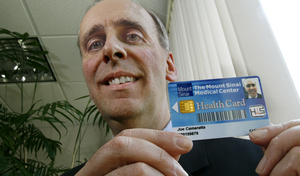One more innovation in the records business...add a tablet PC or UMPC device and the card reading device can be mobile to be used in various areas of the hospital too. Take a look at a product from Tablet Kiosk that does exactly this. In the doctors office this could be very helpful as well instead of having to manually complete the same information over and over on a piece of paper that has been copied so many times that is almost illegible. We all hate filling out the same information at every MD's office. BD

Joseph Camaratta of Siemens Medical in Malvern with one of the firm's "smart cards" being tested at a N.Y. hospital system.
A hospital visit might soon be safer and speedier with a new patient "smart card" that aims to reduce health-care paperwork and protect against medical errors.
In coming months, patients at Mount Sinai Medical Center and nine other New York City metropolitan hospitals will get a wallet-size health card that can carry the equivalent of 30 pages of medical records, everything from blood type to echocardiograms.
The hospital system is using the cards to reduce medical errors, make it easier for patients to communicate with their doctors, present records that are more complete, and minimize the number of insurance-claim denials.
"The smart card helps us identify exactly who we are talking to," said Jack Nelson, chief information officer at Mount Sinai, which serves New York's wealthy Upper East Side and less-wealthy Harlem.
"We have lots of people with the same last name. From a patient-safety standpoint, knowing exactly who we are dealing with is really good," said Nelson, who saw the cards first used at Elmhurst Hospital in Queens in 2003.
The cards can expedite the registration process for patients by storing their most relevant health information, such as current medications and allergies; test results; chronic conditions, such as diabetes, asthma, or congestive heart failure; previous visits to the doctor's office, hospital or clinic; brief medical history; and personal data, such as name, birth date and insurance coverage.
Each card is embedded with a computer chip. On the front of the card is the patient's picture.
The card is encrypted and protected by a personal identification number. At the hospital or doctor's office, the card is inserted into a scanner attached to a personal computer. The patient enters his or her PIN to unlock the data. The only time a PIN can be overridden is during an emergency if the patient is unconscious. Hospital emergency rooms will have a special "reader" that can override a patient's PIN.
If patients lose their cards, they can get new ones from the hospital that issued it.
"This smart card is portable all the way down to a doctor's office," Nelson said. The cost for a doctor is a $12 smart-card reader, which can be plugged into the USB port of a PC, and software that can be downloaded for free from Siemens' Web site.
Area firm tests 'smart cards' on N.Y. patients | Inquirer | 06/18/2007
Read here for another related story referencing another software company with custom software smart card solutions: http://www.zetatec.com/custom-software-development.html
Data Base Applications - Zetatec International
Microsoft® Windows®: Access, SQL, Foxpro
Oracle: SQL Plus, PL/SQL



0 comments :
Post a Comment